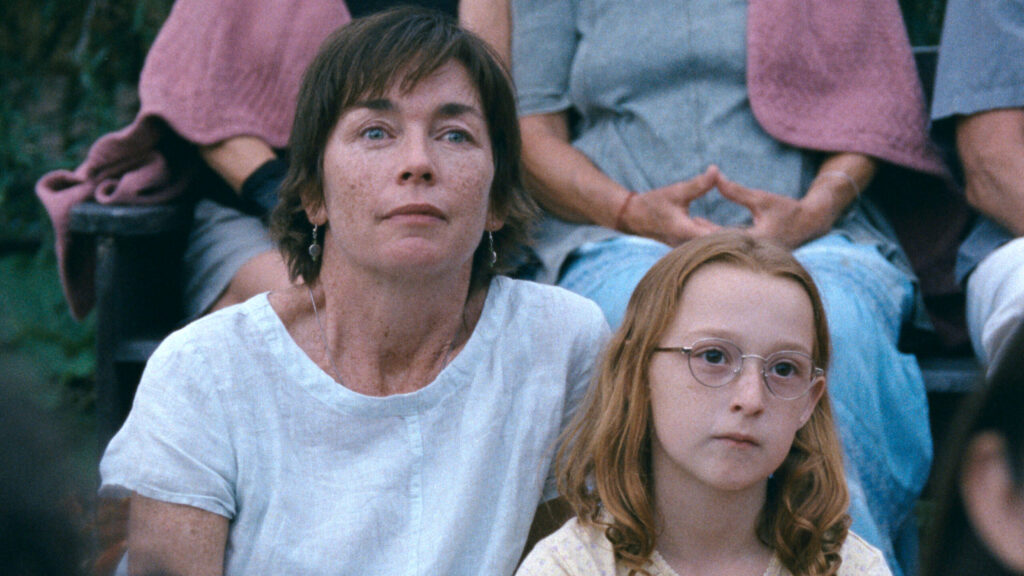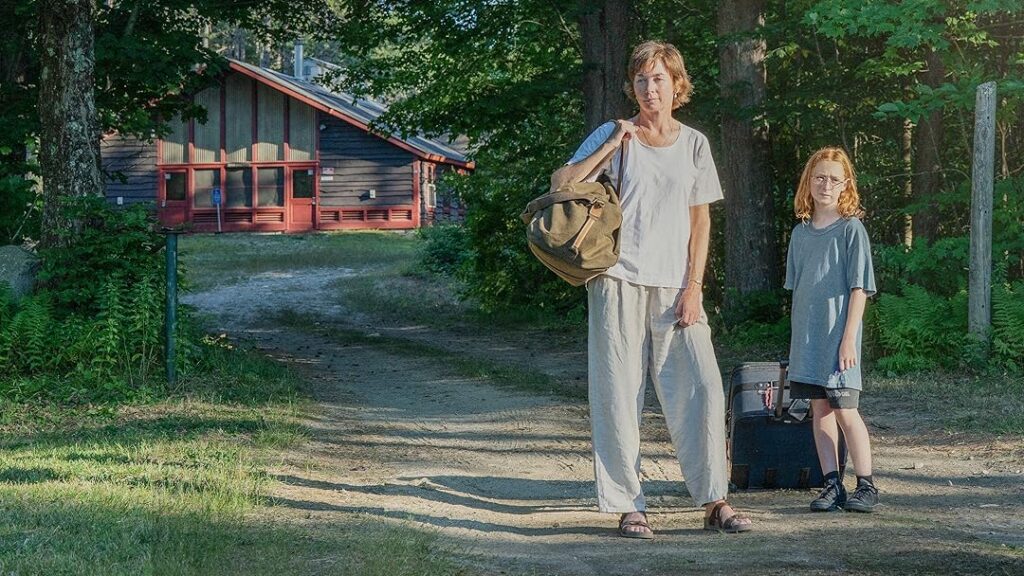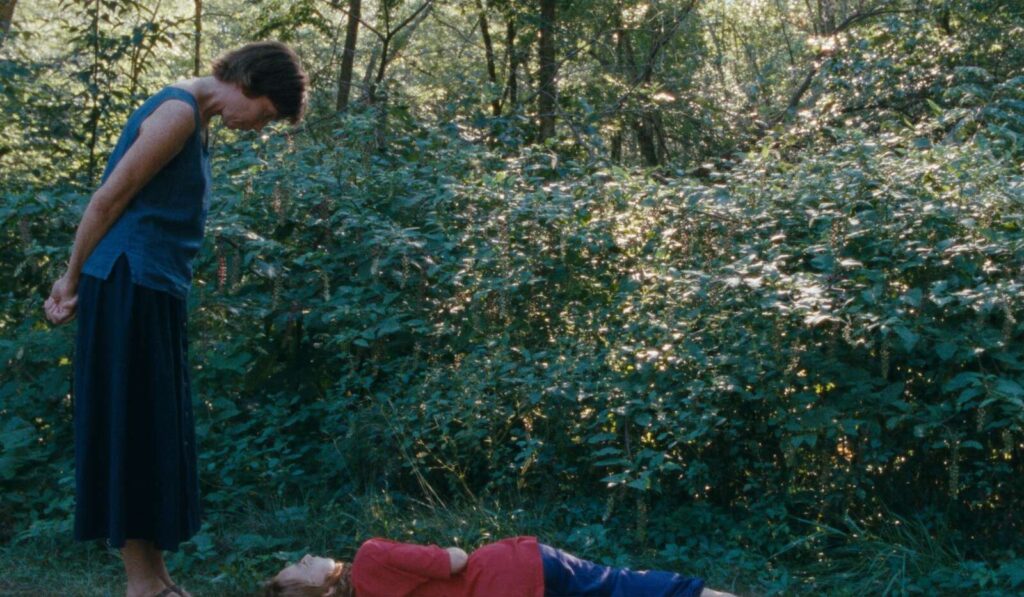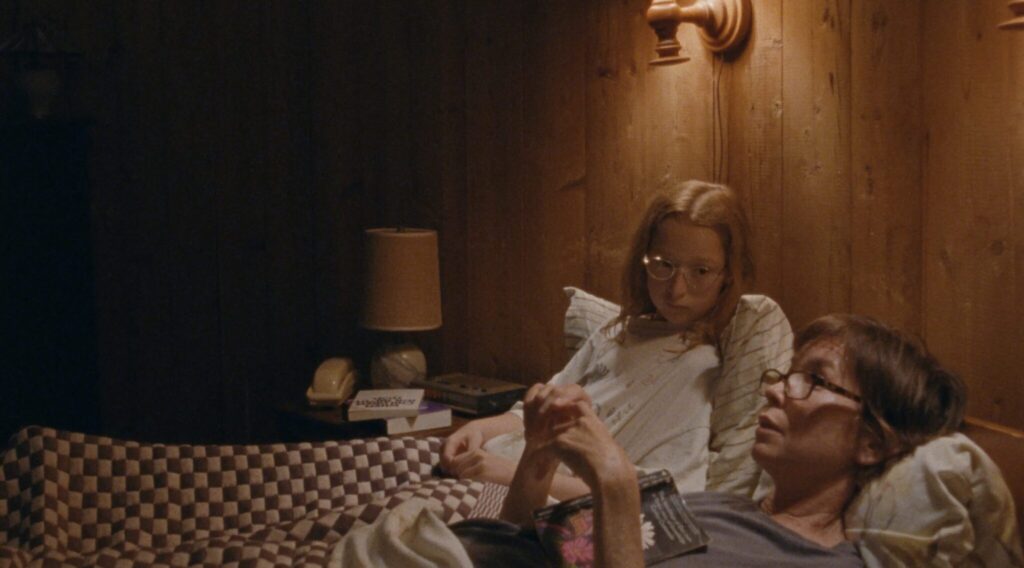
Lacy is bored. Eleven years old and marooned in her woodland home in western Massachusetts, she has no friends, no hobbies (compulsory piano lessons don’t count), and no apparent reason to live. “If you don’t come get me, I’m gonna kill myself,” she declares on the phone in a prayer for deliverance from sleepaway camp. It’s an empty threat because nothing in Lacy’s life is all that bad—her fellow camp kids and counselors seem perfectly nice—but such mediocrity is just another affront. If things were terrible, at least she’d have something to rail against. Having nothing to complain about is somehow worse.
Janet Planet, the directorial debut of Annie Baker, is an eerily persuasive piece of storytelling that understands Lacy’s circumstances almost too well. It transpires over a few sleepy summer months in 1991, and it evokes her predicament—the specific sensation of flailing against the aimlessness of youth—with a clarity that verges on lethargy. In so convincingly depicting tedium, it risks succumbing to it.
The recipient of Lacy’s overdramatic phone call is her mother, Janet (Julianne Nicholson). And the crux of Janet Planet, whose title refers to the shabby shop where Janet practices acupuncture out of her home, is the complex bond between its central mother and daughter—a connection that ranges from steadfast to strained to disturbing.

Janet and Lacy, who is played with sturdy poise by Zoe Ziegler, are in some ways inseparable, often sleeping in the same bed and engaging in frank conversation. Yet while Janet is an affectionate parent, she also chafes against Lacy’s constant neediness, and she longs for a relationship independent from her maternal duties. To that end, Baker has structured her screenplay as a triptych, with each chapter bearing the name of an adult whom Janet spends intimate time with, if not quite dates.
These three grown-ups —a taciturn divorcé (Will Patton), a free-spirited actress (Sophie Okonedo), and a twinkling philosopher (Elias Koteas)—never acquire much in the way of dimension. This is less a failure of writing than a consequence of Baker’s stylistic method, in which virtually all of the action unfolds from Lacy’s perspective. As a result, Janet’s new friends aren’t so much people as intruders, threatening the primacy that Lacy claims in Janet’s life.
If this makes Lacy sound vaguely monstrous, don’t worry; Baker’s technique is too sensitive and empathetic to resort to demon-child histrionics. Lacy, whose inquisitive eyes are encircled by large oval glasses, isn’t exactly a normal girl, but she’s at least abnormal in a normal way, with a precocious forthrightness that can be either enchanting or bratty, depending on her mood. She’s prone to asking overly personal questions, which reveals a genuine curiosity about the world but also often constitutes obnoxious boundary-pushing. Mostly she just wants to spend time with her mom, even if her mom doesn’t always want to spend time with her.

By its nature, Janet Planet is a film where very little of substance actually happens, preferring to hover in life’s in-between spaces rather than manufacturing plotty incidents. This makes it evocative but not especially entertaining; there are stretches where its persistent meandering feels less insightful than shiftless. (When a suitor reads Janet a poem and she replies, “I’m sorry, I spaced out in the middle,” it feels like a meta joke.) The upshot is a movie that tends to be more interesting to think about than it is to watch.
The exceptions—beyond a beautiful instant when Lacy and an ephemeral companion sprint through a shopping mall, the very picture of carefree contentment—arrive in the handful of scenes where mother and daughter lie in bed together and talk, in a manner that’s both tender and unsettling. “Every moment of my life is hell,” Lacy says in a matter-of-fact tone. “I wish you wouldn’t say things like that,” Janet responds, before following up with a startling confession: “I’m actually pretty unhappy too.” Later, Janet informs Lacy of her preternatural ability to make men fall in love with her, then surmises—with either breathtaking honesty or baffling obliviousness—that this putative gift has ruined her life.

These sequences are riveting, not just for their unforced intimacy—Nicholson and Ziegler’s hushed rapport hints at years’ worth of similar murmured exchanges—but for their refusal to assuage our own anxiety. In addition to The Florida Project, Baker’s choice of framing the proceedings from Lacy’s point of view recalls the underrated What Maisie Knew, which centered on a young girl struggling to process the acrimony of her parents’ impending separation. But where that movie ultimately offered a measure of grace to its anguished characters (and viewers), Janet Planet contains no such delusions of eventual happiness. It simply presents a portrait of two decent and flawed people, with all of their love and grief and imperfections.
And also their boredom, at least when it comes to Lacy. Janet Planet honors her experience rather than embellishing it, which is another way of saying it suffocates you with its stifling heat and restless languor. But just as I can’t quite brush past its lazier passages, I can’t shake the suspicion that its sad story will linger, generating more cumulative impact than its spartan parts might otherwise suggest. Perhaps that’s because its emotional collage resembles less a movie than a memory—a hazy summer lost in time.
Grade: B
Jeremy Beck is the editor-in-chief of MovieManifesto. He watches more movies and television than he probably should.
